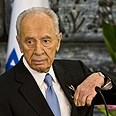
Peres: Next gov't will be committed to seeking peace
During press conference in Prague, Israeli president tries to allay EU, American concerns that Netanyahu-led government may abandon two-state solution; urges Europeans to make sure funds aimed at reconstructing Gaza don't end up in Hamas' hands
During a press conference in Prague on Monday, President Shimon Peres expressed optimism that Israel's next government can achieve Mideast peace, despite the presence of parties within the incoming coalition traditionally opposed to making concessions to the Palestinians.
His comments appeared aimed a soothing both US and EU concern that the new government under Benjamin Netanyahu may abandon the concept of an independent Palestinian state alongside Israel as the primary goal of a Western-backed "road map" to peace in the Middle East.
Peres spoke on the eve of the swearing in of a new Israeli coalition government, including hawkish parties opposed to major concessions to the Palestinians, and after meeting with Vaclav Klaus, president of the Czech Republic, which holds the rotating EU presidency.
Klaus told the Israeli president that the Czech Republic would continue to work towards advancing peace in the Middle East.
Incoming Prime Minister Netanyahu has been a critic of past peace efforts that require Israeli concessions. But he recently pledged that his government — which includes the centrist Labor Party — will pursue peace with the Palestinians.
Peres seized on that promise by expressing optimism that the new government will be fully committed to seeking a Middle East settlement.
"They say 'we shall continue the negotiations with the Palestinians,'" he told reporters. "They say 'we shall negotiate with each one of our neighbors,' they say 'yes, we would like to develop the regional economic opportunities, and they say also we are going to see what can be done in terms of peace on regional level.'
"And then they are saying also they are going to respect the previous government commitments. So I would think this is a very reasonable and promising beginning."
Netanyahu last week said his government would be a "partner for peace with the Palestinians." His comments, just a day after President Barack Obama pledged that the US would push creation of a Palestinian state, reflected a softening of his previous skepticism about Mideast peace negotiations.
During the election campaign, Netanyahu derided the past year of peace efforts and indicated he would halt negotiations to focus on developing the Palestinian economy — a stance alluded to by Peres Monday. Netanyahu also said he would allow existing Jewish settlements to expand to accommodate "natural growth" in their populations.
'Coalition with the rest of the world'
Even if he has moderated his stance, however, Netanyahu has still not specifically expressed backing for an independent Palestinian state. Nor has he spelled out how he would quell expected internal opposition to meaningful talks with the Palestinians.
Besides Labor, at the forefront of peace efforts, Netanyahu's chief partner is Yisrael Beitenu. Its leader and designated foreign minister, Avigdor Lieberman, has drawn allegations of racism for a proposal that could strip Israeli Arabs of their citizenship unless they declare loyalty to the Jewish state.
Another coalition partner, the ultra-Orthodox Shas Party, objects to even discussing sharing Jerusalem with the Palestinians.
The EU also has restated its support for the "two state solution" — an independent Palestine living side to side with Israel.
The EU's foreign policy chief, Javier Solana, warned earlier this month that the EU would rethink its support for Israel unless it backed an independent Palestinian state. And Czech Foreign Minister Karel Schwarzenberg last week said after chairing an EU foreign ministers' meeting that both parties must stick to past commitments that included the "two-state solution."
As head of the EU presidency, the Czech government is keen to push other members to strengthen the bloc's relations with Israel, including better access to the vast European market. But skepticism on the part of some EU member nations may have been strengthened because of perceptions that Israel overreacted in the Gaza conflict and over the incoming government's commitment to the peace process.
Peres suggested that economic cooperation should not be tied to political developments in a global economy.
"We have borders that remain political but are not any more economic," he said, adding Israel needed a "coalition with the rest of the world."
Addressing the IDF's recent offensive in Gaza, Peres said Israel had no other choice but to launch it after its citizens were "lived under the daily threat of terror and rockets for eight years.
He urged the EU to make certain that the funds aimed at reconstructing Gaza don’t end up in Hamas' hands.
As for the Iran, the president told the press conference that its nuclear program posed a danger to Europe and the entire world.










